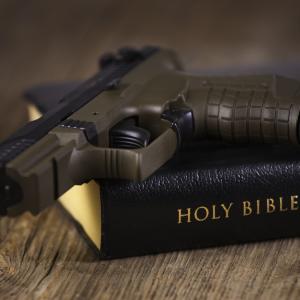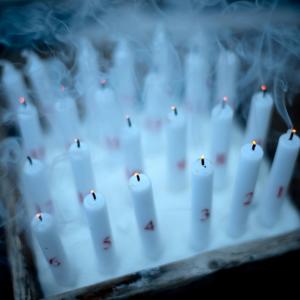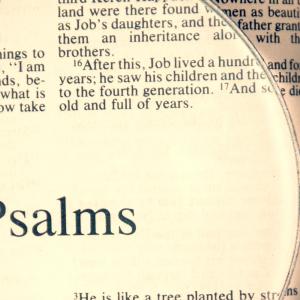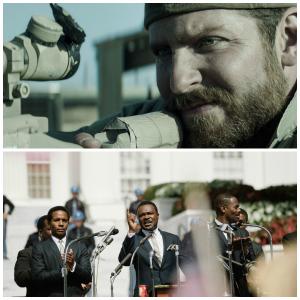
Mark Lockard is an editor at Ministry Matters. He has a Master of Theological Studies degree from Vanderbilt Divinity School, writes and draws for the religion and culture blog DisembodiedBeard.net, and lives in Nashville.
Posts By This Author
When There Is No Future
If irony wasn’t dead, I’d say how ironic it was that in the midst of this season of Advent, in which we look to the nebulous future, a time-not-yet shaped by our ability to be patient and hopeful and tense and a bit sorrowful about what we cannot see but hope we shall soon see, our societal life is filled with those for whom there is no future.
Sen. David Perdue and the Politics and Prayers of Death
Speaking at the Faith and Family Coalition’s Road to Majority conference this morning, Senator David Perdue (R-Ga.) referenced a psalm while speaking about President Obama. The beauty of the Book of Psalms is that it covers the broad range of human emotions, giving us words to hold close whether we’re angry, peaceful, grieving, scared, joyous, thankful, or any combination thereof. So it’s particularly troubling, then, that a powerful public official would use his platform to quote the particular verse he did. It’s especially troubling that it was directed at our highest civic leader. So what did he say, exactly?
After Oregon Shooting, Where Is Our Theology of Life?

Image via djgis / Shutterstock
On Thursday afternoon, a 26-year-old man slaughtered nine people and wounded nine others on the Umpqua Community College campus in Roseburg, Ore. It is a sadly familiar story in this country, routine even. President Obama named it as such in his remarks last week, claiming that we have become “numb” to mass shootings and the discussions that follow. He’s right about that.
But I’d argue that we’re numb to all of our society’s violence, as we have lazily accepted a theology of death rather than do the work to reflect the theology of life so many of us profess to believe. I’m glad for the separation of church and state in this country, so don’t confuse this for me claiming that U.S. society should be run as a Christian institution. Rather, I’m saying that a lot of people in this country who profess to be Christian buy into this acceptance of violent death all too easily. The proof of this is that, shooting after shooting, execution after execution, violent death after violent death, we as a society have not changed. And it is our lack of change that keeps the door open for history to repeat itself.
Making Guns Our God

Image via Lonny Garris/Shutterstock
While I do think there are situations in which violent conflict can be justified (the classic example being fighting to bring down Nazi Germany in WWII), I don’t think it can ever be done so in Christian terms. Theologically, we cannot agree if you assert that killing of any kind can be justified in the name of Christ. I believe this for the reasons given above, namely that Jesus lived, died, and lived again to affirm the blessedness and the sanctity of the lives we live together.
The Christ I know is one of life and peace, even in the face of death. Christ shows us that even if we can’t avoid death, much as we might like to because we are human and a fear of death is natural, we know that life wins out. This is what we’re asked to affirm in when faced with the empty tomb. Losing our fear of harm and death, and lifting up a savior who delights in lives lived fully, is our Christian call. Why can’t we trust in that more than a gun?
Prophetic or a Burden? The Dilemma of Divinity School

Image via Brian A Jackson/Shutterstock
Recently I experienced a wave of frustration related to my student loan debt. This happens from time to time, and really anything can set it off. Debt is stressful, as most of us are aware. Before I dive in, though, I’ve got to say that I’m more fortunate than many; I’ve been able to steadily pay on my debt for a while now. It’s still sizable enough to haunt me, but at least it isn’t a Poltergeist-style terror. That’s not insignificant.
Nothing so far is unique. Thousands of former students are dealing with the exact same thing, though in varying levels of distress or ease. What makes it slightly different is what degree I went into debt for.
I received a Master of Theological Studies degree from Vanderbilt Divinity School. So we’re talking about 1) a graduate degree, as opposed to a bachelor’s, which is widely regarded as necessary in this country to participate in the job market; and 2) a professional degree, meant to lead to practical ministerial work for the social good.
Can the Church Reckon with Racism?

Wall of crosses, Asillem / Shutterstock.com
Racism has the insidious ability to show up in both large and small ways. People being hateful over a comic book character pales in comparison to the horror of Charleston, where a racist individual, emboldened by a wider culture willing to dismiss or outright ignore the realities of white supremacy (especially white male supremacy), slaughtered nine people. But that’s the nature of the virus that is societal racism: it infects broadly, shows up in multiple ways, and is far from easily eradicated.
What is a Christian to do? When events like Charleston occur, we, sadly, have been through similar situations enough times to follow an unspoken script. We condemn (though not always in the right way), we pray, we announce solidarity, and then we move on to the next issue. It’s a cycle that has become heavily problematic, almost to the point where our handling of racism is becoming as troubling as the racism that prompts our reaction.
The Nuance of the 'Nones'
The rising number of people choosing “nothing in particular,“ a subset of the "unaffiliated” label, has raised hackles across the theo-political spectrum, from some fundamentalist evangelicals decrying the de-Christianizing of the nation to more mainline Protestant handwringing over the loss of current and future members from already-struggling denominations.
The problem with this range of views (as far as I’ve read) is that, while certainly broad, it’s pretty shallow. There’s nuance to the “nones.” I can say this with confidence as someone who has drifted across the borders of that category once or twice or every other day. While there are certainly those in the group who don’t care about religion, there are also those with complicated feelings. These are people who still see their lives, maybe all life around them, as uniquely religious. Many have even done the work to interpret such complicated feelings, which is no small task.
Confusing Jesus with Daredevil
Like many comic book fans, I spent the weekend binging on Daredevil, Marvel’s newest release. The entire first season was created for Netflix, and it dropped in its entirety on Friday. I waited until Saturday night to dig in (longer than some friends of mine), and I was hooked from the opening scene.
It's a scene that opens with Matt Murdock (lawyer-by-day alter ego of the masked vigilante Daredevil) sitting in a confessional. He begins by telling the priest about his father, a boxer who fought harder than his record could ever show. He ends the conversation by asking not for penance, but for future forgiveness — forgiveness for what he’s about to do. “That’s not how this works,” the priest says.
Yet so much of how Murdock as Daredevil works in this latest iteration of the character is how we want it to work. Based closely on Frank Miller’s writing of the character, Daredevil proves to be someone who deals justice unflinchingly. This isn’t someone who hesitates when the situation allows for a grim, overly firm hand. Contrast this with Batman, a character who struggles to commit severe violence even when it seems to be the only option.
‘American Sniper’ or ‘Selma’ — How Christian Is Your Movie Choice?
It’s no surprise when we talk about the influential power of the Christian pocketbook when it comes to politics, culture, or any other part of the social fabric in the United States. The conversation has been evolving for quite a while now, but that doesn’t mean that it doesn’t have its standout moments. One such moment was the unexpected box office power of The Passion of the Christ. Large numbers from various faith communities urged their members to buy tickets in an effort to send a message with their purchase. They wanted the box office numbers to speak for Christian influence in the notably secular realm that was, and is, Hollywood. They wanted their money to talk.
I don’t see it as much of a coincidence that, according to The Hollywood Reporter, American Sniper finished its four-day debut on Monday — Martin Luther King Jr. Day — with a historic $107.3 million take. The previous best for a non-Hollywood-tentpole drama? The Passion of the Christ with $83.8 million.
Now, these two openings aren’t directly comparable. There are obviously different sets of circumstances surrounding the two films, including star-actor power, Hollywood support, and (for the purpose of our discussion) how much Christianized effort was involved. The buzz around American Sniper isn’t the same as when people purchased tickets to show support for The Passion of the Christ, even if they didn’t plan on seeing the film. Still, American Sniper brings us face to face with the issue Americans can’t escape in our modern society: the conflation of faith and patriotism.
A week ago, Sojourners ran an article from Religion News Service highlighting the role of Christian faith for Chris Kyle, the sniper and main character played by Bradley Cooper in the Clint Eastwood film. Several quotes from his book were used to call attention to the prominence of faith for Kyle in real life versus the lighter take on it shown in the movie. The article ends with one such quote:
“I believe the fact that I’ve accepted Jesus as my savior will be my salvation. … But in that backroom or whatever it is when God confronts me with my sins, I do not believe any of the kills I had during the war will be among them. Everyone I shot was evil. I had good cause on every shot. They all deserved to die.”
Even if such language is patriotic for those who defend a black-and-white, us-versus-them ideology when it comes to combat, it is disturbing at best in a Christian context.




